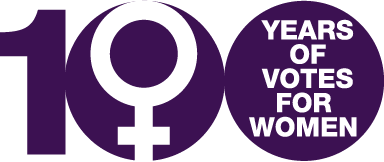2018 marks one hundred years since women won the right to vote for the first time.
Events are taking place to mark the centenary across the country. Find out more about what’s happening over the summer below.
The campaign for the parliamentary vote for women was a long and bitter struggle that began in earnest in the 1860’s. Although the movement is often marked as beginning around 1860, women’s consciousness about full political citizenship had its roots much earlier (for example, Mary Wollstonecraft’s A Vindication of the Rights of Woman which was published in 1792).
The campaign for the vote for women that begun in the 1860’s, and stretched over a period of more than 40 years, had been one of peaceful demonstrations, petitions to parliament, public meetings, lobbying of MPs from all political parties – including the new Independent Labour Party. In 1897, various women’s suffrage societies came together to form the National Union of Women’s Suffrage Societies (NUWSS) led by Millicent Fawcett.

Under the leadership of Millicent Fawcett the NUWSS continued campaigning by peaceful means. Disheartened by the slow progress being made, in 1903 Emmeline Pankhust founded the Women’s Social and Political Union (WSPU). Assisted by her daughters (Christabel, Sylvia and Adela), the WSPU initially engaged in creative peaceful protests, but grew frustrated by the stubbornness of the Liberal government of the day, who had over a long period of time debated women’s suffrage bills but had clearly no intention of passing them. With the slogan ‘Deeds not Words’ the suffragettes were encouraged by the leadership of the WSPU to abandon ‘ladylike tactics’ and to not ask for, but to demand, their democratic right to vote.
The government prohibited women from protesting in public spaces and from 1912 the activities of the suffragettes became more militant and included direct action such as, smashing windows and vandalising letter boxes, but never did their tactics endanger human life. As a consequence, hundreds of suffragettes were arrested and imprisoned during these years of direct action. Many of them adopted the hunger strike as a political tool, and endured force feeding in prison. Women being force-fed created such a public outcry that government introduced the ‘Cat and Mouse Act’ which allowed the authorities to release women from prison when their health became a serious concern. However, as soon as the woman had recovered they would be arrested again and brought back to prison, were most of the women would immediately go on hunger strike again. The suffragettes were daring and brave and they often put their own lives at risk for the cause.
The activities of the WSPU were brought to a halt during the First World War but the activities of the NUWSS continued during this time. Eventually, in 1918 eight and a half a million women were given the right to vote. However, the legislation was restricted to women aged 30 and over, who owned property or were married to someone who owned property. Millions of working class women and younger women would have to wait a further ten years before all women would have the right to vote on equal terms with that of men.

So what of women’s rights today? Millicent Fawcett is acknowledged as the founder of The Fawcett Society. The Fawcett Society is still a campaigning force to be reckoned with, challenging the barriers and obstacles that women still face – equal pay, representation in parliament and in the boardroom and campaign against violence against women, sexual harassment and pregnancy and maternity discrimination. The Fawcett Society acts as a major influencer of public policy for women and families today and has recently published a comprehensive Sex Discrimination Review (January 2018) which demonstrates clearly that, whilst much progress has been made since 1918, there is a lot of work still to be done.
Dr Helen Pankhurst, granddaughter of Sylvia Pankhurst was warmly welcomed to UNISON national women’s conference in February and spoke about her recently published book ‘Deeds not Words’ in which she discusses the questions on so many women’s mind about how far the struggle for women’s equality has come and what equality looks like for women in the 21st Century. Helen believes that whilst much progress has been made in the one hundred years since her great grandmother voted for the first time that there still remains a lot of work to do. The book is on sale now in hardback – the paperback version is due out later this year.
If you are interested in learning more about the women who took part in the campaigns for the vote, there are links to some useful websites below. UNISON also runs a women’s history course in the South East as well as being able to provide shorter workshops for branches. You might be interested in doing something special to commemorate the 100 years of the vote for women and we have listed some ideas below and links to resources that you might find useful. Organisers in the South East are able to assist branches with this too.

